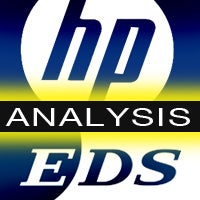 |
Although HP just plunked down $13.9 billion for EDS to expand in outsourcing and services business it may be some time before the computer giant sees results from the merger.
The deal creates a megafirm with $38 billion in combined revenues and 210,000 employees across more than 80 countries. Already, executives are hinting at layoffs to come, which will intensify the infighting and power struggles common in mergers and takeovers.
HP says the transaction is expected to close in the second half of this year, and will more than double HP’s services revenue over the 2007 figure of $16.6 billion. The time lag, and the infighting, will slow down HP’s drive to expand its services arm; meanwhile, both U.S.-based and Indian IT outsourcing and services companies are expected to begin a wave of mergers and acquisitions to take on the new giant in the industry.
The integration of HP (NASDAQ:HPQ) and EDS (NASDAQ:EDS) will be a “medium-term project”, Ben Pring, research vice president for Gartner’s IT services business, told InternetNews.com.
Although HP has made a “smart” decision in keeping EDS as a separate business for now, competitors such as IBM and Accenture “will argue that the HP-EDS executives will take their eye off the marketplace and focus on the power struggles in the business,” Pring said.
Several factors militate against HP realizing any gains from the EDS purchase any time soon: History — the track record of professional business integrations is “not great” Pring said; the scale of the deal, which is “unprecedented”; and the need to establish a proper framework — “they’ll be focused on internal issues for a number of years,” Pring said.
Shareholders Are Not on board?
The market thinks HP overpaid for EDS, which has not been a stellar performer of late; first-quarter profits for EDS showed a 62 percent drop. When word of the deal emerged, HP shares plummeted while EDS shares rose, and both are among the NASDAQ’s most actively traded shares today.
At 4 p.m. Eastern time, EDS stock was up 26 cents, or 1.08 percent, to $24.34, and more than 153 million of its shares had been traded, compared to an average volume of 3.6 million shares. HP stocks were down $2.56 or almost 5.5 percent, to $44.27, with more than 141.5 million shares traded, compared to the average volume of 15.2 million shares.
HP led the list of stocks falling on unusual volume.
In an attempt to defuse the market’s negative reaction to the deal, HP released “preliminary” second-quarter results that were better than expected. Whether or not this succeeds in calming the market’s concerns remains to be seen. If it fails, HP faces a rocky road ahead.
Looking Overseas
All the major players in the services field — IBM, Accenture, EDS and HP — have a strong overseas presence. IBM’s 2007 annual report says 63 percent of its revenue came from outside the United States last year.
IBM has about 50,000 employees in India and Accenture about 22,000, and India has enormous potential, with a huge pool of highly-trained people and lower wage and infrastructure costs.
In India, EDS, through EDS India and MphasiS, which were merged in April 2006, has a workforce of about 28,000 and plans to hire another 6,000 staff this year, according to The Economic Times, Mumbai.
Page 2 of 2
MphasiS delivers global infrastructure technology outsourcing, applications service outsourcing and business process outsourcing in various fields, including manufacturing, healthcare, communications and government, all areas in which HP is a player, so it not only gets a well-known powerhouse in India, but also gets to extend its reach in other markets without restructuring its capabilities.
That reach will be furthered by MphasiS’ presence worldwide: It has 29 offices in nine countries, with delivery centers in India, China, South America and Europe. However, HP may have to make some changes in its Indian operations: MphasiS’ business partners include arch-rival IBM.
Competition To Heat Up
The HP-EDS deal has triggered speculation that IBM will look to acquire an Indian IT outsourcer or two. Both Infosys Technologies (NASDAQ:INFY) and Wipro (NYSE:WIT), with market caps of $25 billion and $19 billion, respectively, are possible targets, and, if IBM picks up either one, the result will be a megadeal that will dwarf the HP-EDS play.
The Indian companies won’t be easy targets: Wipro and another major player, Satyam Computer Services (NASDAQ:SAY) are family-controlled; Tata Consultancy Services (NSE:TCS_A.NS) is majority-owned by the Tata family, which has interests in shipping, steel and other industries; and Infosys is controlled by a group of founders. All of them are cash-rich.
Last year, there were rumors that Infosys or Wipro were thinking of bidding for Cap Gemini (PARIS:CAPG5.PA), Europe’s largest IT firm, but all three denied the rumors and nothing came of it.
Over in India, meanwhile, the talk is that the response to the HP-EDS merger might be a round of mergers and acquisitions among local IT services companies.
These firms have been very aggressive, and Gartner says their IT services revenue grew 38 percent in 2007, although they earned only 4.1 percent of revenue tracked. Pring said that, while the Indian firms look relatively small, they’re “in the top five or 10 key areas where they’ve chosen to focus.”
That kind of strength may bode well for HP’s megadeal.


